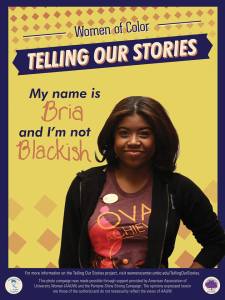Blackish: Telling My Story
I am reclaiming my blackness. It’s been taken, twisted, and transformed into something I no longer recognized. It was deemed less than by the black kids, less than by the white kids, and left me navigating a space with an identity invalid.
My mom and I had a long “discussion” about the term Blackish. This began in reference to the popular TV show, but quickly went down a road that is still painful for me to revisit. In my mom’s opinion, she is black and I am blackish. I understood what she meant. I did not fit the stereotypical “black” mold. In fact, I fit the one she built for me. Predominantly white schools, a two parent household, sports, instruments, pets, private school, a car… the list goes on. These things were and continue to be my normal. Unfortunately, these things simultaneously made me “less than black”. How could that be?
My mom’s lived experiences are different. Her relationship with her dad is virtually nonexistent, she grew up in the inner city, her childhood was a low-income one. Is that what blackness is? Absentee dads? Poverty? The hood?
I’ve been ruminating on these thoughts this Black History Month. I’ve been thinking of my great-grandparents who didn’t establish themselves in a hood, but a neighborhood, with a car and a home they called their own. There were two parents and they worked hard to give their children a taste of middle-class life. They wore furs and diamonds, suits and church hats. They endured overt racism in ways I will never truly understand. Were they blackish too?
I am lost. I am exhausted at the thought of having to prove an identity that was handed to me. It covers every inch of my skin in a fantastic bronze hue. It dictates how strangers react to my face, my resume, my voice, my name. I am black. I am black first. I cannot be anything less.
“What do you say to the white kids when even the black kids say you’re not black enough for them?”
This post is an expansion of my statement in the I’m Not portion of the UMBC Women of Color Coalition’s campaign, “Telling Our Stories” project. For more information about the project and other stories, visit us on Facebook here.

Posted: February 23, 2015, 2:20 PM